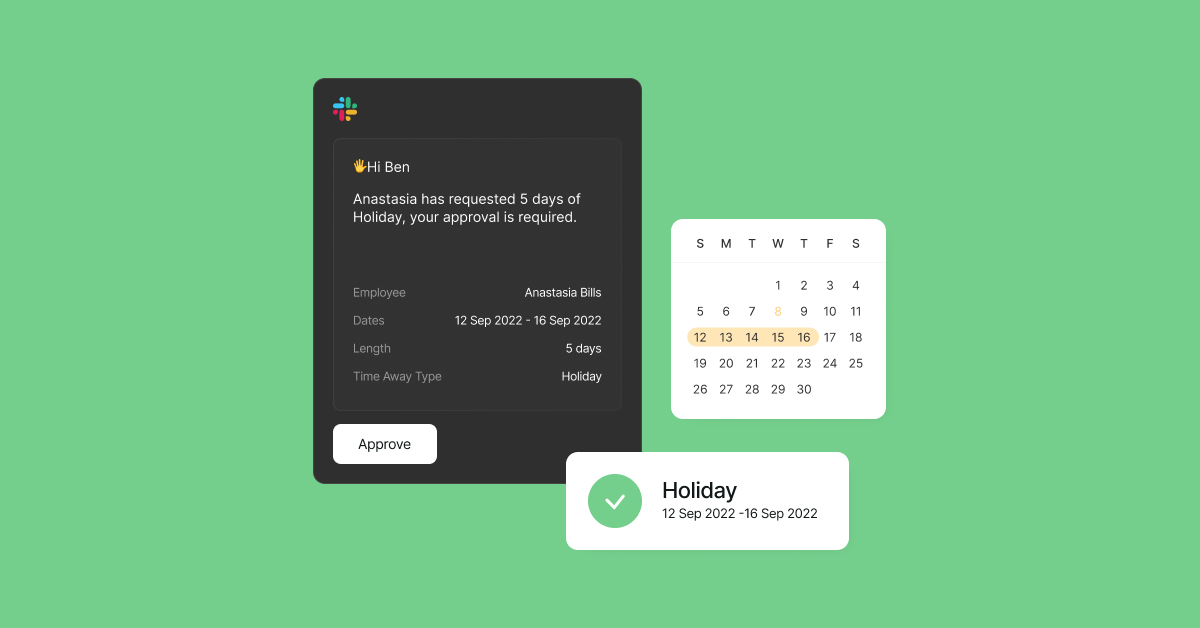How holiday carry over works in the UK
It’s easy to understand why a common employee query is whether they can carry their holiday allowance over from one year to the next. Nobody wants to feel like they have wasted or lost their precious time off work, and it makes sense to assume that one can simply transfer unused days over to the next holiday year.

However, it’s not actually that simple. And as an employer, it’s up to you to clearly define the terms and make sure everyone is on the same page. In this article, we explain whether it’s possible to carry over holidays, how it works, and all the other answers you’ve been looking for.
Annual Leave: A Quick Summary
Before we look specifically at carrying holiday over, let’s do a quick recap of annual leave entitlement and how taking holiday works:
Annual leave entitlement
Most workers in the UK are entitled to 5.6 weeks of paid leave each year. This number usually translates into 28 days of holiday for employees that work full-time. This is also often referred to as ‘statutory leave entitlement’ or ‘annual leave’.
It’s up to you, as the employer, to decide whether you want to include bank holidays within your employees’ annual leave entitlement. You can also choose to offer your workers more than the statutory minimum. It is vital that you respect your workers’ statutory entitlement to take holiday. Paid annual leave is a legal right that you are expected to honour.
Accruing annual leave
As soon as an employee joins your company, they start ‘accruing’ their leave entitlement. You calculate their accrued holiday entitlement according to your ‘leave year’. You should communicate the start and end dates of your statutory leave year to your new employees as part of the onboarding process.
If you don’t outline this specifically in your employment contract, then the leave year is automatically set to start on the day that individual employee starts their job.
Using a tool like Zelt, you can quickly calculate your employee’s accrued leave (and they can check their entitlement instantly). During their first year working for you, they will accrue 1/12th of their annual leave each month.
Carrying over Annual Leave
This section explains the rules around carrying out annual leave, as well as the key exceptions.
Are employees entitled to carry over leave?
The short answer is no. Generally speaking, employees are not entitled to carry over leave, except in a few circumstances, but employers can allow employees to carry over a certain portion of their annual leave entitlement.
Employer agreement to carry over leave
As we outlined earlier, employees get a minimum entitlement of 5.6 weeks of annual leave per year. This is broken down into leave granted by two regulations: 13 and 13A of the Working Time Regulations 1998.
Regulation 13 gives employees 4 weeks of paid holiday, and 13 A gives 1.6 weeks, this is where the total of 5.6 minimum statutory leave allowance comes from. The reason for this split is that the two regulations were brought in at different times. Regulation 13 is the original from 1998, and Regulation 13A was brought in under amendments made in 2007.
The leave under section 13 cannot be carried over in any circumstances, even with employer agreement. However, you can choose to allow your employees to carry over their Regulation 13A leave into the immediate next leave year by putting together and signing an explicit agreement.
At a maximum, therefore, you can allow your workers to carry over 1.6 weeks (for a full time worker, this equates to 8 days) of their annual statutory leave entitlement. But this must be outlined in an employer-employee agreement.
If you choose to offer your workers more than the statutory 5.6 weeks leave, you can allow them to carry over any of this additional leave. You can set out your policy in your employment contract or in a separate policy you can make available to your employees and update from time to time.
Exceptions for Carrying Over Leave
As we’ve seen, employees do not have a general right to carry over holidays. However, there are some exceptions.
Accruing holiday entitlement during maternity
During maternity leave, your employees will continue to accrue their leave entitlement. Your employees can choose to take their existing holiday allowance before their planned maternity leave starts. They can also decide to take their leave after their maternity leave ends.
If they decide not to use their holiday allowance before or after maternity leave, then you have to allow them to carry it over.
Managing holiday Carry Over with Zelt
Now that you’ve understood when holiday can and can’t be carried, you need to make this information readily available to your employees and establish an easy way to manage individual cases.
Zelt is designed to be an intuitive and people-oriented platform that consolidates HR, payroll and IT into a streamlined tool. You can manage employee leave directly from Zelt, track holiday accrual, monitor remaining allowances, and set your organisation’s own holiday carry-over rules. Employees can easily put in their holiday-requests and apply to carry over their eligible unused leave entitlement right from their browser.
Plus, since key documentation can also be stored securely on the platform, employees can instantly check your carry-over policies in their employment contract.
You can get started for free today.
FAQs about Carrying Holiday Over
How many days holiday can I carry over?
Out of your statutory annual leave entitlement, only 1.6 weeks can technically be carried over. But this is only possible where your employer has put together a specific agreement that allows you to carry over your regulation 13A leave into the next leave year.
Also, if your employer chooses to offer more than the minimum statutory entitlement, you may be able to carry over more than this.
How can I carry over annual leave?
If you are allowed to under your employment contract, and you have remaining untaken leave that is eligible, you should communicate this to your employer. If your workplace uses a tool like Zelt, you can file this request directly through the platform.


